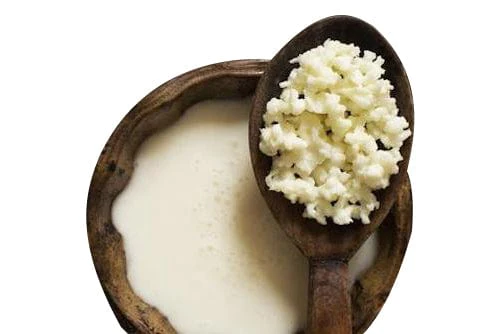Kefir has become increasingly popular and is displayed on the refrigerated counters of many supermarkets. With a consistency similar to yogurt, a neutral flavor and acidity similar to plain Greek yogurt, and high digestibility and versatility, it is certainly hard not to like it. Above all, it is a food rich in properties and benefits below!
1) Vitamins and More
Milk kefir is rich in B vitamins, especially vitamin B9, folic acid, and vitamin K. Minerals cannot be neglected, as kefir is also rich in calcium, magnesium, potassium, phosphorus and protein.
2) Promotes Bone Health and Reduces the Risk of Osteoporosis
Kefir promotes bone health and reduces the risk of osteoporosis. Osteoporosis is a disease characterized by the deterioration of bone tissue and is very common in older women in the West.
Getting enough calcium is one of the most effective ways to improve bone health and slow the progression of osteoporosis. Whole kefir is rich in calcium and vitamin K2, which plays a central role in calcium metabolism; K2 supplementation reduces the risk of bone fractures by 81%.
3) More Potent Probiotics Than Yogurt
Some microorganisms have a positive effect on health when consumed. We’re talking about probiotics, which can help with digestion, weight management, and, as scientific studies have shown, even mental health.
Yogurt is generally considered the best probiotic food in the Mediterranean diet. In fact, kefir is even richer in these valuable microorganisms.
Kefir grains contain up to 61 strains of bacteria and yeasts, making it a rich and diverse source of probiotics.
4) Good Bacteria for the Gut and Immune System
We know the importance of probiotic bacteria in maintaining good gut health. They also improve immunity by promoting the formation of antibodies in the body.
5) Contributes to a Feeling of Fullness
In addition, kefir works well in low-calorie diets because it reduces hunger by creating a feeling of satiety.

6) Kefir and Celiac Disease
The probiotics in kefir help regulate the intestinal flora of celiac disease patients and weaken the body’s immune response to gluten. These are the results of several scientific studies that may help celiac disease patients cope better with the disease.
7) Hyperactivity and Insomnia
Kefir contains tryptophan, an amino acid that calms the nervous system. This is a valuable substance for those who suffer from hyperactivity and insomnia. Some also point to it as a panacea against cancer. However, there is no scientific evidence to support this.
8) It Has Very Few Calories
If you are on a diet, you need not worry about calories: 100 g has a minimum of 30 kcal and a maximum of 110 kcal (depending on the type of milk used as a base). It also contains very little lactose.
9) Contains Folic Acid
Vitamin B9 helps reduce the risk of fetal malformations and malformations during menopause, fights osteoporosis, and counteracts mood swings. Because of its high folic acid content, it is also recommended for pregnant women.
10) Effective for Asthma and Allergies
Kefir can help fight inflammatory reactions in our bodies that cause allergic reactions to harmless substances. It may be an exceptional remedy for allergy and asthma symptoms. However, make sure to consult your doctor if you’re unsure about consuming it.

11) Effective in Fighting Digestive Disorders
Recent studies have also shown that kefir can help with digestive problems in the elderly and children. It has also been helpful for bronchial, liver, intestinal, and kidney disease.
12) Helpful After Taking Antibiotics
Kefir has anti-inflammatory origins and was used as a tonic after illness and long-term recovery. In fact, it may improve intestinal health.
Have you ever had kefir? Share your experience with us in the comments below!



Pingback: The Self-Tensiometer: To Measure Your Blood Pressure Yourself – Hello sites